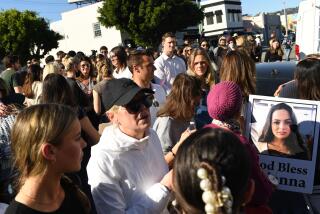Murder trial of former Oakland Raiders player ends in mistrial
- Share via
The trial of a former Oakland Raiders defensive end accused of murder ended in a mistrial Wednesday when jurors failed to reach agreement on a verdict, according to authorities.
Los Angeles County Superior Court Judge Carlos A. Chung terminated the trial after jurors were unable to reach a verdict on whether Anthony Wayne Smith was involved in the killing of 31-year-old mechanic Maurilio Ponce on Oct. 7, 2008.
The jury, which deliberated for nine days, split 8 to 4 for a guilty verdict, said Sandi Gibbons, a spokeswoman for the L.A. County district attorney’s office.
Smith, 44, who played professional football with the Los Angeles and Oakland Raiders in the 1990s, will remain in custody, L.A. County Superior Court spokeswoman Patricia Kelly said. He will be retried along with 33-year-old Dewann Wesley White of Bloomington, who was also charged in connection with Ponce’s death, Kelly said.
A third defendant, Eric Honest, 42, of Los Angeles, was found guilty last week of second-degree murder, according to Michael S. Evans, Smith’s defense attorney. That crime generally carries a sentence of 15 years to life, Evans said.
The defense attorney insisted during the trial that Smith was innocent and had no reason to kill Ponce. Further, there was no physical evidence, such as DNA or a gun with Smith’s fingerprints, to tie him to the crime, Evans said.
On Wednesday, Evans said he would be able to “get a better understanding” of why the jurors failed to reach a final verdict once he had a chance to properly debrief them. He said some of them had indicated that they found testimony about cellphone records confusing.
Prosecutors hinged much of their case on cellphone tracking technology that they argued placed Smith and his two alleged accomplices near the scene of Ponce’s killing. Ponce’s body was found with six gunshot wounds, including two to the head.
Deputy Dist. Atty. Taly Peretz had urged the jury to convict Smith of first-degree murder.
During the trial, Peretz presented the panel with a timeline of phone calls she said established the “pattern of travel” of Smith, Honest and White on Oct. 6 as they coordinated, eventually hooked up, headed to Lancaster to allegedly kill Ponce, and then returned to Los Angeles. A phone call Smith made to Ponce at 11:07 p.m. finally lured the victim from his house and to his death, Peretz said.
She pointed out that after Ponce was known to be dead, the victim’s cellphone — later found with Smith — was “pinging off” towers in the area where the cellphones of Honest and White were also registering.
But Evans, the defense attorney, argued that if Smith killed Ponce, why would he have called Ponce’s phone almost half a dozen times the morning after his death?
“There would be no reason to call Ponce if he knew he was dead and [Smith] had his truck and his phone,” Evans said.
More to Read
Sign up for Essential California
The most important California stories and recommendations in your inbox every morning.
You may occasionally receive promotional content from the Los Angeles Times.














